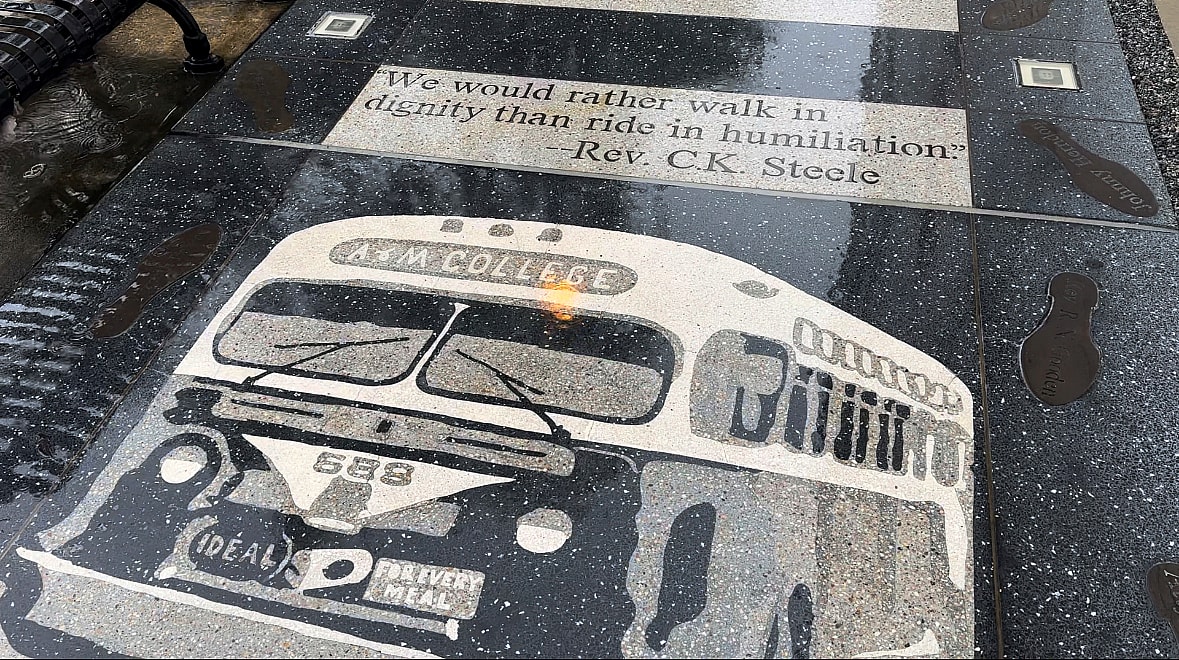TALLAHASSEE, Fla. (AP) — A core mission of Florida A&M University from its founding over a century ago has been to educate African Americans. It was written into the law that established the school along with another college, in Gainesville, reserved for white students.
At Florida’s only public historically Black university, some students now fear political constraints might get in the way of teaching parts of their history.
A law signed last spring by Gov. Ron DeSantis, a candidate for the Republican presidential nomination, blocks public colleges from using taxpayer money on diversity programs. It also forbids instruction of theories that “systemic racism, sexism, oppression, and privilege are inherent in the institutions of the United States and were created to maintain social, political, and economic inequities.”
The new law, part of broader GOP efforts to rein in campus efforts on equity and inclusion, has spurred protests on campus. Some students say they are watching for signs the new guidance will affect teaching of topics related to race and American history.

Chad Preston, a senior political science major, said he worries some viewpoints will be silenced.
“We deserve the same level of education that all these other states are getting. We deserve the same information,” he said.
DeSantis describes the law as an effort to rid university classrooms of what he calls left-leaning “woke” indoctrination. His education policies — including limits on what schools can teach about racism and which bathrooms students use — have faced criticism from civil rights leaders but fueled his political rise by harnessing culture war passions.
“In reality, what this concept of DEI has been is to attempt to impose orthodoxy on the university,” DeSantis said at a ceremony in May when he signed the bill into law. “This has basically been used as a veneer to impose an ideological agenda, and that is wrong.”
The university, founded in 1887, hosts about 10,000 students at its campus a few blocks from the state capitol.
The new law has made Florida a difficult learning environment for students and faculty of color, said Marybeth Gasman, a Rutgers University historian whose research focuses on historically Black colleges and universities and systemic racism in higher education.
Recommended Stories
“I’ve talked to some FAMU faculty who have basically told me that they’re keeping their head down because they’re afraid they’re going to lose their jobs,” Gasman said. “If I were in Florida, I would probably be concerned as well.”
FAMU has not seen upheaval anywhere near the scale of New College of Florida, a progressive campus where DeSantis and his allies overhauled the Board of Trustees and installed a majority of conservative figures. But many on the FAMU campus are wary.
Asked about the impact of the new law, a university spokesperson referred to a comment Florida A&M President Larry Robinson made in June.
“There are more than 30 pieces of legislation passed this legislative session that have some impact on educational institutions in Florida, including FAMU, and we take them all seriously,” Robinson said. “But our commitment to ‘Excellence With Caring’ remains strong, and remains unchanged.”
In early December, the board overseeing Florida’s state university system released proposed regulations outlining programs that would be prohibited from receiving state or federal money under the new law. Programs on the outs would include any that promote “differential or preferential treatment of individuals, or classifies such individuals on the basis of race, color, sex, national origin, gender identity, or sexual orientation.”

The FAMU Democrats have been taking steps to ensure the messages of speakers they invite to campus are moderate, said Jovan Mickens, a senior and president of the student political group.
“With my organization, there are certain things I can’t do like bring certain people on campus for a panel discussion. We’re tip-toeing around this university,” he said.
Historically Black colleges and universities often receive less funding than predominantly white public colleges. A group of students at FAMU have filed a lawsuit against the state, saying it has underfunded their school by nearly $1.3 billion.
But for leaders of public colleges, pushing back on policies they disagree with could put them at odds with the same officials deciding on their budgets, said Abul Pitre, chair of the Department of Africana Studies at San Francisco State University.
“It requires a certain kind of balance that does not allow them to have too much of an Afrocentric social justice perspective, because they have to go to the same politicians for money who are advocating to eliminate it,” he said.
Raghan Pickett, a senior at FAMU, traces her lineage back to Rosewood, Florida, where hundreds of Black people were killed or driven out in 1923 by a mob of white men who then destroyed their neighborhoods. She fears the new law could stop instructors from teaching about such atrocities.
“Back then, it was afraid of being lynched,” Pickett said. “Today, Black people are still struggling. We’re still fighting to learn basic history.”
The Associated Press education team receives support from the Carnegie Corporation of New York. The AP is solely responsible for all content.
Never miss a beat: Get our daily stories straight to your inbox with theGrio’s newsletter.








